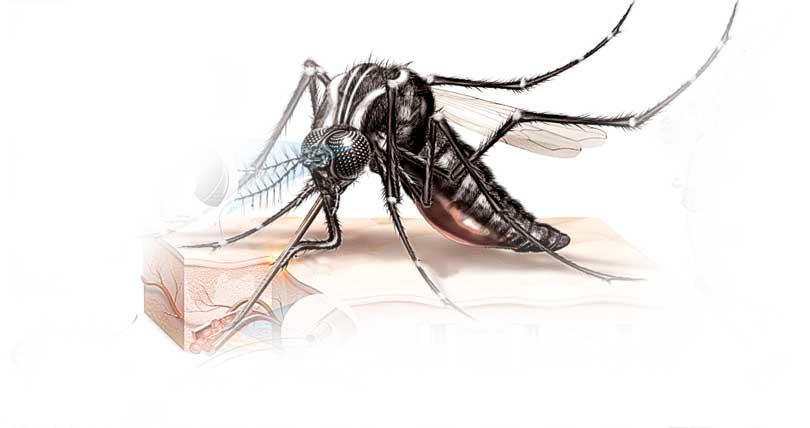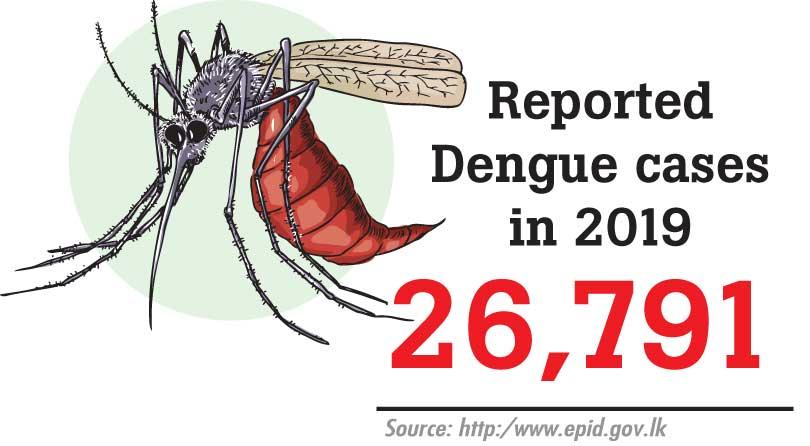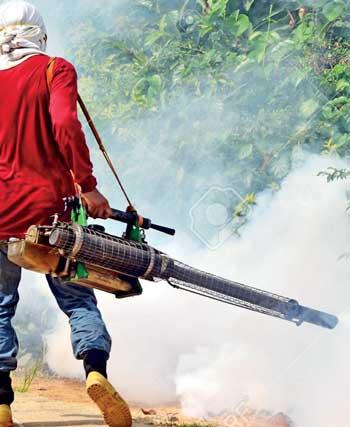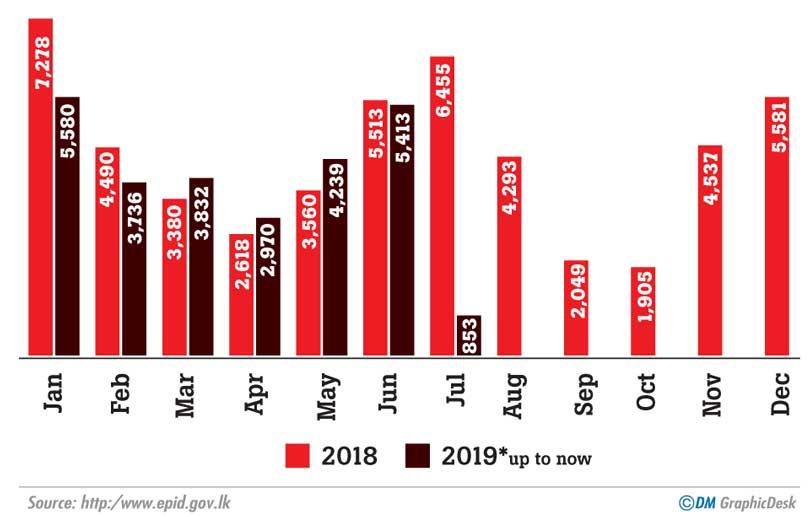10 Jul 2019 - {{hitsCtrl.values.hits}}


After a particularly hot and humid May this year, many Sri Lankans would have eagerly anticipated the south-western monsoon to ease their discomfort. Each year, what Sri Lankans don’t expect however, seems to be the ensuing outbreak of the deadly dengue virus. 2019 doesn’t seem to be any different for a country grappling with yet another outbreak of the disease, with most residents in disease hotspots unaware of the illness.
Consultant Epidemiologist of the National Focal Point, Dr. Hasitha Tissera, said that the number of dengue cases reported for the year 2019 is at a staggering 26,629, while 35 fatalities have been reported this year. 5,413 cases have been reported during the month of June alone. Asked if the data points to an increase in the number of dengue cases being reported, Dr. Tissera said there’s a definite increase in the number of dengue cases reported this year.
Karapitya Teaching Hospital,
Colombo National Hospital,
National Institute of Infectious Diseases,
Lady Ridgeway Hospital for Children and the Colombo
South Teaching Hospital
Coping with high numbers of patients
Persons suffering from a fever should consult a medical professional, if fever persists for a second day, Dr. Tissera said. Pregnant mothers and young children however are advised to seek medical treatment on the first day of fever, in order to avoid complications.
“Once diagnosed with fever, doctors would identify if there is a need for the patient to be hospitalised. In the meantime, fever patients should avoid taking un-prescribed medication to counter the fever and especially avoid painkillers. The indiscriminate use of medication isn’t advised. If you suspect fever, you must take medication only under the guidance of a doctor. Painkillers, other than paracetamol, cause internal bleeding and act similar to blood thinners,” he said.
Epidemiologist indicates rise in dengue cases, Dengue control unit downplays the severity
Dr. Tissera stressed that being diagnosed with dengue fever is no cause for alarm as it is a treatable condition. However he noted that such a patient’s health should be monitored constantly and therefore should seek treatment at the nearest hospital. Vomiting, severe abdominal pain, feeling faintish are particular warning signs which doctors would be vigilant of, Dr. Tissera said. “If a child or a person appears confused and if his or her consciousness appears to be deteriorating, such persons should be presented for treatment immediately.

Meanwhile if you are suffering from some form of bleeding or exaggerated menstrual bleeding, such persons should seek immediate medical advice, as they are also warning signs which we look for,” he said. “Under normal circumstances, a person should pass urine every four to five hours. However if the urine passage reduces, that is also a cause for concern,” he warned.
According to Dr. Tissera four high risk districts including Colombo, Gampaha, Galle, and Ratnapura have been identified by the Epidemiology unit. With figures pointing towards a sharp rise in the number of dengue cases in the country, several unsuspected areas such as Kalutara, Kandy, Matara and Jaffna have also fallen victim to the disease. According to experts, with the onset of the monsoon, the risk of dengue exists across the country and transmission through mosquitoes occurs all year-round. Viruses are tiny agents that can infect a variety of living organisms. The dengue virus, similar to other viruses, has a microscopic structure that can only replicate inside a host organism. The dengue virus is transmitted to humans via the bite of an infected mosquito. Only a few mosquito species are vectors or vehicles which carry and transmit the disease to its host organism. Historical data suggest that dengue transmission in Sri Lanka has two peak seasons; October to December and May to July.
Under-utilised wards opened to accommodate influx of patients
Asked of what precautionary measures were taken to curb the epidemic, Dr. Prasheela Samaraweera of the National Dengue Control Unit denied reports of a heavy outbreak this year. “Although there’s no major outbreak of dengue cases, the Dengue Control Unit is doing everything we can to improve the situation,” she assured.
However Dr. Samaraweera admitted that there were reports of high incidence of dengue in several districts including Colombo, Gampaha, Kalutara, Galle, Matara, Ratnapura and Kegalle. “There’s only a minor increase of dengue cases in these areas. We have deployed search operations in areas where high incidences have been reported. Meanwhile the Medical Offices of Health are carrying out awareness campaigns, inspection of houses in addition to fumigation, in all these areas,” she said.
Asked if there are special preventive campaigns in place to reduce further spread of the disease, Dr. Samaraweera said that the unit has sought the help of volunteer corps to counter
the malady.
“Since we cannot conduct these campaigns with military personnel as we used to, we have recruited volunteers to form health teams to assist us in this process. The volunteers are from organisations such as Red Cross and Sarvodaya and they are deployed to various locations, depending on the severity of the disease in that area,” she elaborated.
If you suspect fever, you must take medication only under the guidance of a doctor
Dr. Hasitha Tissera
Detailing how the severity of disease is identified, Dr. Samaraweera said that the unit relies on data received from every hospital in the island. “We receive data from approximately 150 hospitals in the island through a web-based system, according to which we decide on how to deploy these teams,” she said.
 According to Dr. Samaraweera, the Karapitya Teaching Hospital, Colombo National Hospital, National Institute of Infectious Diseases, Lady Ridgeway Hospital for Children and the Colombo South Teaching Hospital in Kalubowila are the hospitals burdened with the most number of dengue cases this year. Dr. Samaraweera assured that there were no reports of overcrowding in these hospitals, adding that they are well equipped to manage this situation. “There is absolutely no similarity to the situation in 2017. The number of cases reported this year is even lesser than the number of dengue cases reported in 2018.”
According to Dr. Samaraweera, the Karapitya Teaching Hospital, Colombo National Hospital, National Institute of Infectious Diseases, Lady Ridgeway Hospital for Children and the Colombo South Teaching Hospital in Kalubowila are the hospitals burdened with the most number of dengue cases this year. Dr. Samaraweera assured that there were no reports of overcrowding in these hospitals, adding that they are well equipped to manage this situation. “There is absolutely no similarity to the situation in 2017. The number of cases reported this year is even lesser than the number of dengue cases reported in 2018.”
Asked if the numbers are expected to rise with the onset of the Southwestern monsoon, Dr. Samaraweera said that it’s unlikely for the disease to spread further. “We recently had a meeting with the Director General of Health Services on managing this disease. The Health Services Directors of the high risk areas, Medical Officers as well as epidemiologists were present at this meeting where they discussed the way forward, with detailed guidelines of how to manage this situation. Therefore I think the situation should not deteriorate further,” she opined.
Infectious Disease Hospital understaffed, requires doctors for children’s and medical wards
The Director of the Karapitiya Teaching Hospital Dr. G. Wijesooriya said that although there was a steady rise in the number of dengue patients admitted to the hospital, medical officers have observed a decline in the number of patients over the past week. “Earlier we had about 10 to 12 dengue patients receiving treatment in each ward. However over the past week there has been a decrease in this number. Now we have less than 6 patients in every ward,” he noted.
Dr. Wijesooriya added however that those hospital authorities are taking necessary precautions and are braced to accommodate more patients at the hospital, in the event that there’s a further spread of the virus, due to the inclement weather conditions.
Meanwhile at the National Institute of Infectious Diseases (NIID), there is a steady flow of patients seeking treatment for suspected dengue fever. “There’s an obvious rise in the number of dengue patients this year. The month of July however is the month in which we entertain a larger number of dengue patients,” Director of the hospital, Dr. Hasitha Attanayake said. “The numbers of patients we have received at the NIID this year isn’t exceptional, but recently we’ve been receiving a lot of dengue patients. The hospital has exceeded its bed capacity due to this influx,” he noted.
Out of the total 237 patients receiving treatment at NIID, 121 patients are receiving treatment for dengue, almost half the total number of patients warded at the hospital. “We’ve conducted a preliminary assessment of the hospital’s preparedness. We hope that we would remain resilient in facing this epidemic,” Dr. Attanayake said.
Over 26,000 dengue cases and 35 deaths reported in 2019
The Director added that the hospital is operating with only one fifth of the allocated medical professionals’ cardre. “Approval has been granted for 50 doctors, but we’ve only got 40 on board with us at the hospital. We currently have a shortage of 10 doctors,” Dr. Attanayake said adding that the hospital has been coping with difficulty owing to some internal arrangements.

Asked if the Director has requested health authorities to remedy the situation, he said that a request has been made to the Ministry of Health to rectify the issue urgently. “We’re hoping that the intern appointments would be issued early, through which this issue would be solved. We require the services of doctors especially at the children’s wards and medical wards where most medical services are required,” he underscored.
Asked how the hospital is coping with its bed capacity exceeded, Dr. Attanayake said that the hospital has opened an under-utilised ward, to accommodate patients. “We can provide beds, but a space issue would arise. That’s not a matter which can be solved easily,” he said. “We are not expecting a dengue epidemic as severe as in 2013, although the numbers are certainly high this year, compared to 2018,” Dr. Attanayake added.
29 Dec 2024 8 minute ago
29 Dec 2024 3 hours ago
29 Dec 2024 3 hours ago
29 Dec 2024 4 hours ago
29 Dec 2024 6 hours ago